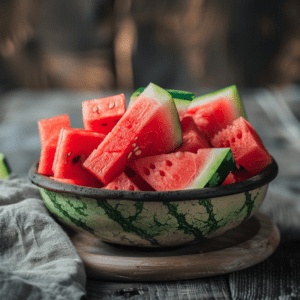
If you love benefits of Eating Watermelon, you’re lucky—it’s more than just a juicy, delicious treat! This summer favorite is packed with health benefits, making it a perfect addition to your diet. Beyond its refreshing flavor, watermelon hydrates support heart health, boost skin, and even aid digestion. Here’s why watermelon deserves a spot on your plate and a few easy ways to enjoy it all year.
What’s Inside Watermelon?
Watermelon isn’t just water and sugar. It’s loaded with nutrients that benefit your body in several ways:
High in Water
Watermelon is over 90% water, making it a fantastic way to stay hydrated, especially during hot weather. Hydration is essential for everything from maintaining energy levels to supporting skin health. Drinking water is great, but eating watermelon adds flavor and extra nutrients to your hydration routine.
Packed with Vitamins and Minerals
Watermelon delivers several vital vitamins and minerals, including vitamins A and C, potassium, and magnesium. Vitamin C supports immune health and skin elasticity, while vitamin A helps repair skin and supports eye health. Potassium keeps fluid levels balanced in your body and assists with muscle contractions, while magnesium is a crucial player in hundreds of bodily processes, including bone health and energy production.
Low in Calories
One of the best things about watermelon is that it’s low in calories but naturally sweet. This makes it a fantastic snack if you’re trying to cut back on high-calorie treats. Watermelon has only roughly 46 calories per cup offers a satisfying way to enjoy a sweet, refreshing snack without guilt.
Health Benefits of Watermelon
Now, let’s break down exactly what watermelon can do for your health.
Supports Heart Health
Watermelon contains lycopene, an antioxidant known to benefit heart health. Lycopene helps reduce oxidative stress and may lower cholesterol, two significant factors in heart health. It also helps keep your arteries flexible and blood pressure steady, reducing the risk of heart disease. Potassium and magnesium in watermelon also work to keep your heart healthy. Magnesium promotes a steady heartbeat, while potassium relaxes blood arteries to reduce blood pressure.
Boosts Skin and Hair Health
The vitamins in watermelon work wonders for skin and hair. Vitamin C is essential for collagen synthesis protein that maintains the firmness and smoothness of your skin. Collagen also strengthens hair so regular watermelon intake can help with healthy, glowing skin, and vibrant hair. Vitamin A in watermelon helps skin cells regenerate, so eating it often can contribute to a fresh, youthful look.
Reduces Muscle Soreness
If you’re active, watermelon might be your new best friend. This fruit is rich in citrulline, an amino acid that helps reduce muscle soreness and speeds up recovery after workouts. Citrulline improves blood flow to muscles, which may help relieve some of the aches and stiffness you feel after a challenging workout. Consuming watermelon juice either prior to or following physical activity can keep you hydrated and aid recovery.
Aids Digestion
Watermelon is excellent for digestion, thanks to its mix of water and fiber. Fiber enhances the digestive system’s health by giving your stool, which helps prevent constipation. Watermelon’s high water content also keeps things moving smoothly in your digestive tract, especially during summer when dehydration can slow things down. Enjoying a few slices daily can help keep your gut happy and healthy.
Boosts Immune Function
With a combination of vitamins A and C, watermelon boosts your immune system. Vitamin C improves immune function, helping your body fend off infections. Vitamin A strengthens the mucous membranes that are part of your body’s first line of defense against illness. Eating watermelon regularly can help you stay healthy, mainly when seasonal colds or flu occur.
Simple Methods for Including Watermelon in Your Diet
Want to get more watermelon in your day? Here are a few easy, tasty ways to enjoy it:
Blend It Into Smoothies
Watermelon is perfect for smoothies because it’s naturally sweet and hydrating. Try blending it with ice, strawberries, and a bit of mint for a refreshing treat. For a tropical twist, add some mango or pineapple. Smoothies are a great way to start the day or cool off in the afternoon, and watermelon blends well with almost any fruit.
Make a Watermelon Salad
Watermelon salad might sound unusual, but it’s a delicious mix of flavors. Try pairing cubed watermelon with crumbled feta cheese and fresh mint for a savory-sweet treat. The feta’s saltiness contrasts nicely with the sweetness of the watermelon, and the mint adds a refreshing touch. You can add some arugula or cucumber slices for extra texture and flavor.
Freeze for Watermelon Popsicles
Frozen watermelon treats are a great way to cool down when temperatures are high. Freeze chunks of watermelon for a quick snack, or make popsicles by pureeing the fruit and pouring it into molds. Add a squeeze of lime or a few berries before freezing for an extra flavor boost. These frozen treats are low in sugar, refreshing, and perfect for summer!
Conclusion
Benefits of eating watermelon isn’t just a delicious fruit—it’s a powerful way to boost hydration, heart health, skin glow, digestion, and immunity. With its low-calorie, nutrient-packed profile, watermelon is an intelligent choice whether you’re snacking, recovering after a workout, or just looking to enjoy a healthy treat. So, the next time you’re at the store, grab a watermelon, slice it up, and enjoy it differently. Your body will thank you for the boost!
If you want to learn my #1 Wonder Melon Organic Watermelon Juice with Cucumber & Basil, Click Here Now





